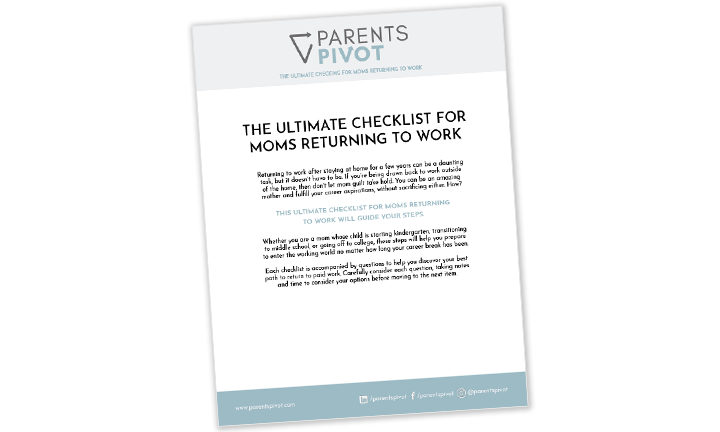At the end of each year, you’ll start seeing “year in review” videos and post montages from your social media connections that platforms have put together for users making it easy to press play and reminisce on what you’ve shared over the last year. It’s a fun way to look back at old photos and remember those cute things that your children did, those vacations you took, and those impromptu dance parties during a playdate with friends.
While the “year in review” posts are light hearted and fun, the idea of reflection is nothing new and certainly not siloed within social media. It’s a natural human tendency to reflect on how things are going and reminisce about changes that happened within our families and careers – both the good and bad. Unfortunately, our busy lives and crammed schedules prevent us from slowing down and taking time to reflect…and rest…regularly.
As a busy mom who is considering returning to work outside of the home soon, or has already pivoted back to paid work and is wanting to move forward with intention, it’s time to make time in your schedule to pause, reflect, and enjoy the benefits that self reflection can bring to not only motherhood, but for those big life changes coming your way.
The Importance of Self Reflection and Why we Hesitate
Reflection is simply the process of remembering past experiences and carefully considering what you can learn from them. Reflection takes past actions, behaviors, and emotions, and processes them to more deeply understand them.
As a mother, you may be thinking that there are some things that happened recently that you would rather forget rather than sit in reflection. Reflection can be difficult and requires us to be vulnerable, reliving moments of embarrassment, mistakes, hurt, and confusion. Even so, a recent Harvard Business Review article encourages us to not take self reflection for granted, as it’s been proven to propel leaders and provide success in many facets of life. We can learn from our mistakes and take valuable lessons with us that propel us towards positive change in business and in motherhood. Reflection provides insights into the WHY things are happening, allowing us to be proactive in our actions instead of reactive. Reflection puts us in charge of our circumstances instead of the other way around.
If you are nervous to try self reflection, I encourage you to give it a try a handful of times and then make your assessment after weighing the discomfort it brought with the benefits you received.
Benefits of Self Reflection in Motherhood
Motherhood specifically can greatly benefit from regular self reflection. As any mother to adult children will attest, our children grow up f-a-s-t. We blink and they are no longer our snuggly babies. Regular reflection allows us to savor the precious moments we have with our children and hide them away in our hearts. Reflection can solidify moments in our memories so that we don’t forget them as quickly. We don’t want to miss a thing while they are growing, and reflection can help us with that throughout their childhood.
Reflection can also help us when big life changes are coming to our family. For example, if you know that a new baby will be joining your family soon (congratulations!), you can reflect on how your other children have adapted to change in the past and proactively help them prepare and transition even before the baby comes.
Benefits of Reflection For Your Career
If you are thinking of going back to work after being home for a while, reflection can help you determine what you want to do, where you want to work, how many hours you want to work, and if you want to work in an office or at home. Ponder questions such as:
What did I enjoy doing for work before I had children?
Will I still enjoy doing that now that I am a mom?
When I had the opportunity, how did I choose to spend my time during my career pause?
What volunteer roles did I take on and would I like to incorporate that work in my return?
What household logistics will need to change if I work outside of the home?
How will I be able to manage and balance all of my tasks if I work from home?
Reflecting on these questions (which is certainly not an exhaustive list) can help you establish goals, gather your village to support you during this transition, and set you and your entire family up for success when the time comes to make the change.
If you are already working, self reflection can help you regularly assess if anything needs to change in order to keep your career goals and family priorities aligned. Oftentimes, it’s very hard to balance a career with family life when clear boundaries aren’t set or if the lines between who is responsible for what gets blurred.
How To Make Time For Regular Reflection As A Busy Mom
If you are on board to make self reflection in motherhood a regular practice in your life but don’t know how you will ever fit it in between piles of laundry, soccer practice shuttling, meal prep, and everything else on your list, here are a few simple tips for implementing reflection into your day-to-day life.
Find times where your brain can breathe. Even if your body is busy, your brain might have a chance to slow down. For example, if the kids are chatting amongst themselves when you are the carpool driver, take the 15 minutes in the car for reflection. If you are folding laundry after the kids are in bed, that is the perfect time to spend 20 minutes in reflection instead of turning on Netflix.
Schedule it into your day. Reflection is important, so putting it on your calendar is one way to make sure it gets done. Put it on your phone, set a reminder, and sit down for reflection time. If daily is too much, try scheduling it 2 or 3 times a week and go from there.
Make reflection a family activity. A bit non-traditional, but making reflection time a family affair is a great way to make sure it happens. You can have everyone reflect on their own, silently, or turn it into a group discussion to reflect on something that happened to the entire family. You can start this with your kids at a young age by asking simple questions and encouraging them to share.
If the thought of adding self reflection to your to-do list stresses you out, start out slow and find small moments here and there where you can ask yourself a simple, “how did that go” question. Take a moment to think about it, then move it. It doesn’t need to be anything formal or stressful. You can make it work for you.
Get Support For Those Big Life Changes
Motherhood is a special time in our lives when we have the honor to see our children grow from tiny newborns dependent on our every need to full grown adults who are ready to spread their wings. Reflection is an important part of that process to help us navigate the many life changes that happen along the way.
If you are considering returning to paid work after a career pause and need support as you reflect on your past experiences and where to go from here, Parents Pivot is here to help. We’d love to help you process through your experiences to propel you into your next stage of life. Explore our 1:1 and group coaching services to learn more.









